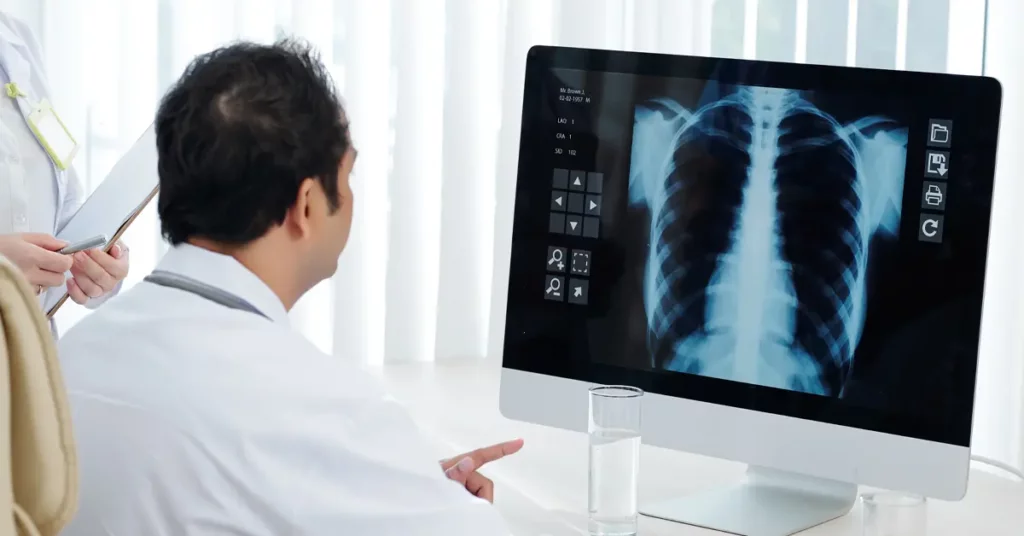The third most frequent cancer in the US is lung cancer. In the United States, skin cancer, breast cancer (in women), and prostate cancer are the three most prevalent types of cancer (among men). Lung cancer is the most common type of cancer to cause death in the US. For both men and women, this is true.(1) The following strategies can help you prevent lung cancer:
Avoid smoking
Never start smoking if you haven’t already. Talk to your kids about quitting so they can learn how to avoid this significant lung cancer risk factor. Talk to your kids about the risks of smoking when they are young so they will be prepared to handle peer pressure.
Give up smoking
Quit smoking right away. Even if you’ve been a smoker for a long time, quitting lowers your chance of lung cancer. Consult your doctor for advice on effective methods and cessation assistance. Options include drugs, support groups, and nicotine replacement therapies.
Don’t smoke around others
Encourage a smoker to stop if you live or work with them. Ask them to smoke outside, at the very least. Don’t go to places where people smoke, including pubs and restaurants, and look for smoke-free places to go instead.
Check for radon in your house
Radon is a radioactive gas that rock and earth can release. It has no color or odor. In well-insulated homes, it can accumulate through the foundation and leak up. Check your home’s radon levels, primarily if you reside in a region where radon is known to be an issue. You can lower your home’s radon levels to make it safer. Contact your neighborhood’s public health department or an American Lung Association branch for more about radon testing in your area.
Stay away from carcinogens at work
Lung cancer risk can increase as a result of chemical exposure. These consist of:
- asbestos
- arsenic
- nickel
- soot
- cadmium
- silica
- engine exhaust
Your level of exposure raises your risk. Take care to shield yourself from workplace exposure to hazardous chemicals. Observe the safety recommendations of your workplace. Wear a face mask that has been provided to you as protection, for instance, at all times. What else can you do to safeguard yourself at work? Ask your doctor. If you smoke, you run a higher chance of developing lung cancer from your job’s toxins.
Eat a lot of fruits and veggies in your diet
Pick a balanced diet that includes a range of fruits and vegetables. Vitamins and nutrients are best obtained from food sources. Vitamins taken as pills should not be used in high dosages since they may be dangerous.
Do some exercise
According to a growing body of research, regular exercise may significantly reduce the chance of developing lung cancer and other cancers. It is advised that most individuals engage in strength training exercises on at least two days per week in addition to 150 minutes (2 hours and 30 minutes) of moderate-intensity aerobic activity each week.
Be familiar with your family history
You may be up to twice as likely to develop lung cancer than those who don’t have a family history if an immediate family member (such as a parent or sibling) has the disease. This elevated risk is a result of both hereditary and environmental factors. Make sure you contact your doctor if any members of your immediate family—smokers or nonsmokers—develop lung cancer. To help lower your risk, they could advise getting some screenings.
Do not expose your chest to radiation
Your DNA can be harmed by high-energy radiation, including X-rays, gamma rays, and other radioactive waves, which raises your risk of developing cancer. Your lungs may suffer from cell damage from specific medical treatments that could result in cancer. This includes actions like:
- scan of the chest
- CT scanning
- a PET test
- radiation treatment
These operations carry a modest risk of malignancy; generally, the advantages outweigh the disadvantages. However, if you have additional lung cancer risk factors, you might wish to discuss safer alternatives with your doctor.
Read more:
Quitting Smoking: Tips to Manage Withdrawal Symptoms
What Happens When You Quit Smoking?
Tobacco Smoking and Hypertension
Takeaway
You may take many steps to reduce your risk of developing lung cancer. Many of these prevention techniques, such as giving up smoking, engaging in regular exercise, and adhering to a balanced diet, can enhance your general health in numerous ways. Consult your doctor if you have concerns about your risk of developing lung cancer and what you can do to reduce that risk. They might recommend tests or other measures to help reduce your risk.
If you have lung cancer or other related diseases, you may ask your healthcare provider about Remote Patient Monitoring or contact us for more information.









